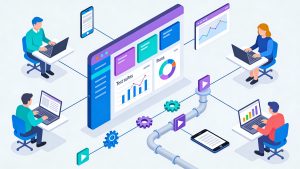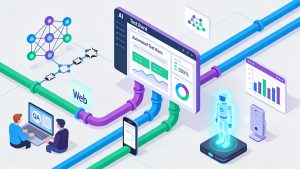Java marked its 25th anniversary on 23 May, 2020, and the perennial programming language is still very much in vogue. Java is a constantly evolving field, and this keeps Java developers ever-relevant to the contemporary job market. However, this also means that what one perceives to be the complete Java developer skill set is subject to ongoing enhancements and refining. Today, hiring trends suggest that alongside a good grasp of core Java concepts, current-day Java developer roles and responsibilities include some expertise in skills such as AWS, Android development, Git, Docker, and Spring.
But, even as Java developer skills in 2020 embrace new horizons, the on-ground reality is that as a programmer, it is a challenge to keep yourself up to date. Perhaps the last time you returned to the drawing board was to master Java version 8 or maybe 9! While this may seem like yesterday, the latest launch of Java 15 this year brings some interesting new features.
Keeping this mind, updating yourself and learning advanced Java skills is essential to your career growth. With multiple paths to honing your Java skills available today, starting now may be more important than where. To set you on the right track, here are 10+ ways to upskill and remain relevant in 2021.
1. Deep-dive into basic software engineering concepts like data structures
Even intelligent people make silly mistakes in conversation, such as saying ‘first come, first serve’, instead of ‘first come, first served’. In such cases, it is generally a question of going back to theory, to the basic elements of the language, and understanding the nuances one is missing out on. The same idea applies to coding languages. Just like the rules pertaining to verbs, for instance, pertain to other spoken languages, so too, in computer language, there are core concepts that apply to pretty much every script, old and new.
Here are 10 concepts you can delve deeper into and build a stronger foundation:
- Multithreading
- Data structures
- Algorithms
- Code locking
- Data types and data abstraction
- Control flow and control abstraction
- Variables
- Conditional statements
- Functions
- Looping and iteration
2. Keep pace with Java version 9, 10, 11… 15
Java is, at times, called a vintage language, but is still very much in use with new releases launching often. If Java development is your core skill then what you’ll want to do is stay abreast of the features being added, improved, and deprecated. For instance, JDK 15 is just days away from general availability (launching on 15 September, 2020) and some of the JEPs targeted were:
- 339: Edwards-Curve Digital Signature Algorithm (EdDSA)
- 360: Sealed Classes (Preview)
- 371: Hidden Classes
You can find all this information on the Open JDK project page and, in fact, you can even get a sneak-peek into JDK 16 there.
3. Get a grasp of Java EE & the Spring framework
The Java Enterprise Edition provides companies with the libraries, APIs, services, and tools to build large-scale distributed systems. However, companies can also adopt the immensely popular Spring framework, which being open source reduces licensing costs. That said, as an adept Java developer you should try to master both arts and not side with just one camp. Doing so is feasible owing to the commonality of the APIs and moreover, gives you an idea of which stack will be better for a given application.
4. Supercharge your skills with the combo of Docker & Kubernetes
The combination of Docker and Kubernetes has been termed as ‘lethal’ and if you have some years left in your career there’s more than a fat chance you’ll cross paths with them. A Gartner study projects that over 70% of global organisations will run more than 2 containerised applications in production. This is a jump from less than 20% in 2019. To get started with both, you can turn to online materials or read books such as The Docker Book by James Turnbull and Kubernetes: Up and Running: Dive into the Future of Infrastructure by Brendan Burns, Joe Beda, and Kelsey Hightower.
5. Add a frontend framework such as Angular or React to your toolkit
Over time, you may find yourself developing apps with only a particular client-side framework such as jQuery, but it is helpful to, time and again, find out what’s popular or even the status quo worldwide. React, Angular and Vue are popular and powerful; however, the State of JS 2019 report adds Svelte, Preact, and Ember to the top-ranked front-end frameworks as well. The online tutorials, courses, forums, and communities are plenty and so, you are sure to find yourself with adequate resources.
6. Step into the world of Blockchain technology
Deloitte’s 2020 Global Blockchain Survey on ~1,500 senior executives reveals that 88% agree that blockchain is broadly scalable and will achieve mainstream adoption. As a Java developer, blockchain can seem to be a world of its own. Thankfully, there are a few things you can do to get a handle on it:
- Study Bitcoin and Ethereum
- Explore Java-based blockchain projects like BitcoinJ, Corda, and FundRequest
- Master Solidity and Hyperledger
7. Find your way around the microservices architecture with Spring Boot 2
The microservice architecture lets you build large systems with small, independent, collaborating components. This system makes for efficient deployment and scalability. Netflix, in fact, used this system to speed up global development and achieve a quick time-to-market. In the world of Java, Spring Boot is a leading, if not the leading, microservice framework. It is currently in edition 2.3.3 and, once again, there are plenty of online resources including those by spring.io to get you started quickly.
8. Explore open source big data tools such as Apache Spark and Hadoop
An IBM study forecasted a 28% spike (5-year growth) in Data Scientist and Advanced Analyst roles by 2020. Java can be a great starting point for becoming a big data developer and the future of Java with big data looks bright. There are a handful of open source tools that you can use by Apache to begin processing huge datasets:
- Hadoop
- Spark
- Mahout
- Storm
There are other tools like MongoDB, RapidMiner, and Cassandra that you can use as well, however, you can’t really go wrong with learning Hadoop.
9. Prepare for cloud environments by learning platforms like AWS
According to 451 Research in 2018, about 90% of organisations will be on the cloud soon. As a developer, this means the ability to develop cloud-based applications is a key skill and, here, it’s worth noting that the bulk of the enterprises, even 88% as per one statistic, use Amazon Web Services (AWS) as their platform of choice. However, you can also learn Google Cloud Platform (GCP) or Microsoft Azure, and what you learn in one will help you navigate the other.
10. Implement Machine learning algorithms using Java
Google’s AlphaGo is a potent example of self-teaching algorithms and machine learning has many real-world applications: from self-driving cars to product recommendations and fraud detection. To prepare for the world of tomorrow, you can try your hand at some ML algorithms using Java. Top ML libraries and tools you can use are:
- MLib (Apache Spark)
- Deeplearning4j
- Java-ML
- Mahout
- Weka
So, there you have it! These 10 avenues can see you grow leaps and bounds as a Java developer. However, here are a few additional things you can do to hone your skills:
- Experiment with writing mobile apps for Android
- Master more than a handful of basic Git commands
- Discover the worth of message brokers like ActiveMQ and Kafka
- Play around with automation tools such as Gradle and Maven
As you gain additional skills, you’ll simultaneously make forays into DevOps, even as more organisations adopt the methodology. That’s something of great importance in the job market, which can be easily tailored to your new-found abilities with Talent500’s dynamic skill assessment and machine learning algorithms. These pair your software development skills to the needs of Fortune 500 companies in search of the top 10% of talent!
As the fourth quarter of 2020 dawns, pick one of these 10+ skills to make headway as a Java developer and sign up with Talent500 to get access to premium jobs with Fortune 500 companies.



